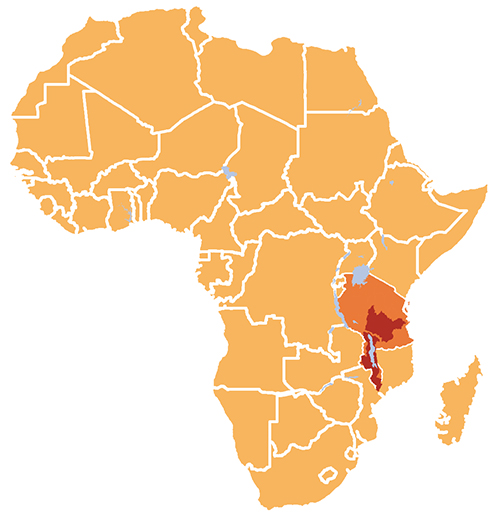The current and future climate of central and southern Africa: What we have learnt and what it means for decision-making in Malawi and Tanzania

Download
This brief summarises the main lessons from four years of the UMFULA project – Uncertainty Reduction in Models for Understanding Development Applications. Led by the Grantham Research Institute, UMFULA has addressed questions of climate science, climate impacts and decision-making processes for adaptation in central and southern Africa.
UMFULA has produced case studies in Malawi and Tanzania focusing on managing water in a context of increasing demand for agricultural production and hydropower (the so-called water–energy–food nexus) under a changing climate. In Malawi research focused on the Lake Malawi Shire River Basin. Outflows from Lake Malawi into the Shire River are critical for hydropower and irrigation, and also for biodiversity. The Tanzania research focused on the Rufiji River Basin, a significant source of water for drinking, irrigation, livestock and hydropower.
Questions asked by UMFULA
- How does the climate of central and southern Africa work? And how well do climate models represent the key processes responsible for climate?
- How might the climate of central and southern Africa change in future decades out to ~2050 and how sure are we about the projected changes?
- To what extent can decision-making approaches incorporate climate change uncertainties within investment decisions that cut across the water, energy and food sectors?
- How does the political and institutional environment influence the usefulness and usability of climate information for adaptive decision-making?
Summary of results
- Understanding the likely future characteristics of climate risk is a key component of adaptation and climate-resilient planning, but given future uncertainty it is important to design approaches that are strongly informed by local considerations and are robust to uncertainty, i.e. options that work reasonably well across a range of uncertain future climate (and other) conditions.
- Choosing the right tools and approach for climate risk assessment and adaptation to suit the scale of the decision allows a suitable trade-off between robustness and resources required (time and expertise) for analysis.
- In the medium term, policy decisions require careful cross-sectoral planning, particularly in cases involving large investments, long life-times and irreversibility, where there is a strong argument for assessing resilience to future climate change (for example around water, energy and food in Malawi and Tanzania).
- The process of co-production of knowledge by researchers and wider stakeholders contributes to building societal and institutional capacity to factor climate risks into long-term planning. It also builds the capacity of researchers to better understand real world decision contexts in which climate change is one of many important factors.
UMFULA is funded by the UK’s Department for International Development (DfID) and Natural Environment Research Council (NERC) and is implemented by five consortia and a Coordination, Capacity and Knowledge Exchange Unit (CCKE).
Please cite this document as follows: UMFULA (2019) The current and future climate of central and southern Africa: What we have learnt and what it means for decision-making in Malawi and Tanzania. Future Climate For Africa Programme, Cape Town.

